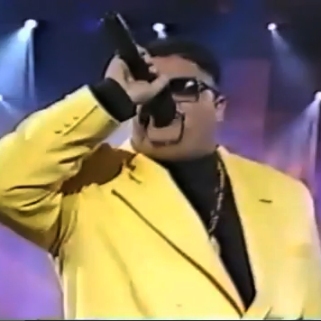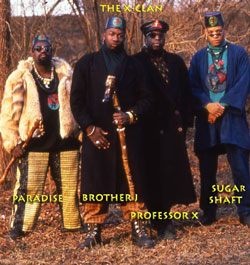 Yesterday Hip Hop lost a pioneering figure and legend Adam ‘MCA’ Yauch of the Beastie Boys. There’s so much one can say about him ranging from his pioneering status of being a member of one of the first successful white acts in Hip Hop (they sold more than 40 million albums) to his activism around Tibet and their independence movement and more recently around Occupy Wall Street.
Yesterday Hip Hop lost a pioneering figure and legend Adam ‘MCA’ Yauch of the Beastie Boys. There’s so much one can say about him ranging from his pioneering status of being a member of one of the first successful white acts in Hip Hop (they sold more than 40 million albums) to his activism around Tibet and their independence movement and more recently around Occupy Wall Street.
It was pointed out by writer Dave Zirin that Yauch who had been battling cancer for the past 3 years was part of that infamous March last fall across the Brooklyn Bridge when police were shown beating and arresting over 700 protestors.Yauch risked arrest and bodily harm that day in his participation.. He was in the middle of cancer treatments when he marched.
We can talk about Yauch coming out of Punk Rock culture and and how there’s a rich and undervalued history that shows how early Hip Hop and Punk found kinship and natural alliance as members of both genres felt alienated and disenfranchised by society and back then, a disco laden, formulaic music industry.
 We can talk about Yauch being part of a crew who under the musical production of Rick Rubin as writer Dan Charnas recently noted, helped usher Hip Hop from the Beat Box era to the sampling era. We can talk about how Run DMC introduced the world to the Beastie Boys and later the Beasties introduced the world to Public Enemy.
We can talk about Yauch being part of a crew who under the musical production of Rick Rubin as writer Dan Charnas recently noted, helped usher Hip Hop from the Beat Box era to the sampling era. We can talk about how Run DMC introduced the world to the Beastie Boys and later the Beasties introduced the world to Public Enemy.
We can talk about Yauch branching out and becoming a skilled music video producer and film director. He founded Oscilloscope Laboratories, an independent film production and distribution company based out of New York City.
Adam did great things. He accomplished much… and those who knew him personally described him as serious, sensitive, genuine and a really cool guy. He will definitely be missed.
Yesterday we did a tribute n Hard Knock Radio 94.1 FM with Big Payback author Dan Charnas. Here’s what he had to say about Adam MCA Yauch
http://www.youtube.com/watch?v=74WJkyUtBYs

Heavy D is one of many iconic figures to pass away from health related ailments before the age of 50
Above and beyond his music career and activism, for many in the Hip Hop Generation Adam’s death underscores a very disturbing trend. Him dying at 47 is increasingly becoming commonplace where many of our icons, peers, family and friends are barely living to 50. In the past couple of years we’ve lost many legends including MIchael Jackson, Whitney Houston, J-Dilla, Guru, Professor X, Big Pun, Poetic, DJ Screw, Heavy D, Eyedea, MC Breed, Pimp C, Big Moe, ODB, Nate Dogg, Bernie Mac, and Special One of the Conscious Daughters just to name a few..
These names are on top of those we know and love who died violently or via accident like; Proof, Freaky Tah, Big L, Stack Bundles, Souljah Slim, Left Eye, Aaliyah, Dolla, M-Bone, Mac Dre, Left Eye and most recently football legend Junior Seau.
If we toss in names like Eazy E, Marvin Gaye, 2Pac and Biggie the names of untimely death is a long one.
Yesterday someone attempting to be stoic & cavalier upon hearing about the death of Adam, asserted, ‘Oh well death is a part of life’..
I responded; ‘What kind of life is this when so many who we, know, luv and admire are all dying before the age of 50.’
This is not just about people dying at the hands of violence, but so many on the list of names I noted above, are dying from health related ailments. This is unacceptable and should not be ‘just a part of life’. That’s called settling.
 During our tribute show around Adam’s death Paradise Gray of the group X-Clan came on and recounted his friendship with Adam. He also reminded our listeners how the Hip Hop Generation has grown up in a world during the Reagan era when society started dismantling safety nets. Our generation saw the beginning of repressive forces gutting and further privatizing healthcare and other much-needed services..
During our tribute show around Adam’s death Paradise Gray of the group X-Clan came on and recounted his friendship with Adam. He also reminded our listeners how the Hip Hop Generation has grown up in a world during the Reagan era when society started dismantling safety nets. Our generation saw the beginning of repressive forces gutting and further privatizing healthcare and other much-needed services..
Paradise said we are now starting to see the results of that societal divestment with so many people checking out before age 50.
‘Many in Hip Hop never had health insurance’, Paradise said. This is an issue he knows all too well having lost two of his groups members to untimely health related death, Sugar Shaft and Professor X.
Here’s our Interview w/ Paradise Gray:
It’s not just health insurance when your sick, but the ability to go to the doctor, get routine check ups and be educated on ways top prevent early disease. Paradise said over the next 10 years things will get worse, because many never really took care of themselves or had the opportunity or resources and as a generation hits their late 40s and then 50s illnesses will start to emerge and yield serious consequences.
 We lost Adam to cancer, but in recent times we’ve some like artist/activist DJ Kuttin’ Kandi and pioneering photographer Ernie Paniccioli who have been saddled with massive medical bills after getting sick. Last year we were all out collecting money Ernie who was diagnosed with cancer as well as for the Father of Hip Hop Kool Herc who suffered from severe kidney stones and had no health insurance. Kandi who was recently had her heart stop and had to get emergency surgery is raising money for her care HERE
We lost Adam to cancer, but in recent times we’ve some like artist/activist DJ Kuttin’ Kandi and pioneering photographer Ernie Paniccioli who have been saddled with massive medical bills after getting sick. Last year we were all out collecting money Ernie who was diagnosed with cancer as well as for the Father of Hip Hop Kool Herc who suffered from severe kidney stones and had no health insurance. Kandi who was recently had her heart stop and had to get emergency surgery is raising money for her care HERE
In the wake of Adam’s passing, the Hip Hop Generation has much to reflect upon. The Black Panthers who were a couple of generations ahead of us, had the good common sense to open up free health clinics for the community. This act may have saved countless lives. We within Hip Hop need to step our game up in a big way and take the vast amounts of money and resources we have access to and follow suit. We should do this for ourselves and do this for those in our ranks who are ailing. We should do this in memory of Adam who we saw emerge as a keen activist, generous and thoughtful man….
RIP Adam MCA Yauch
Podcast: Play in new window | Download


